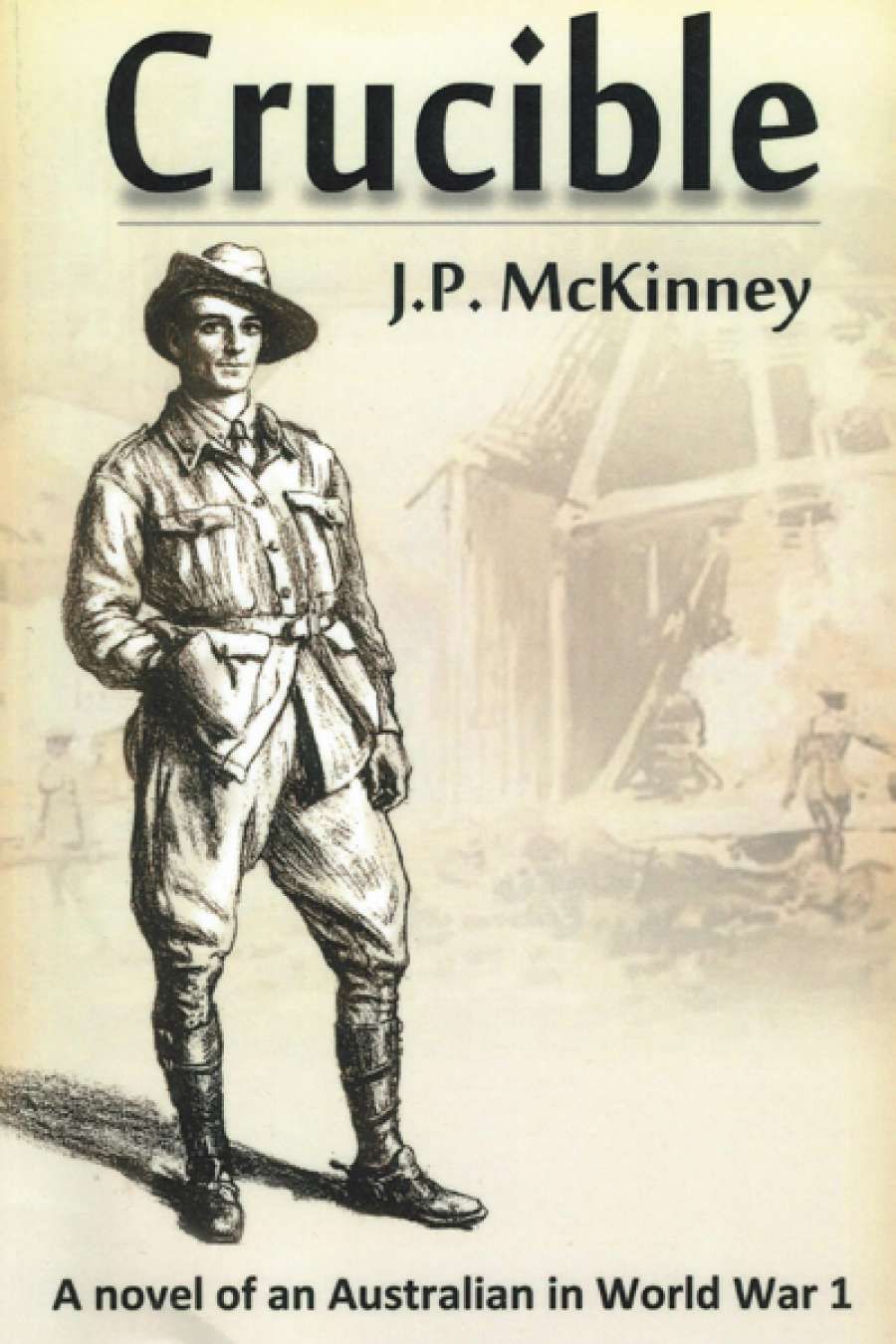
- Free Article: No
- Contents Category: Fiction
- Review Article: Yes
- Article Title: A vast white shroud
- Article Subtitle: J.P. McKinney's Great War Novel
- Online Only: No
- Custom Highlight Text:
Everybody knows by now that the eBook may soon become as significant to literature as recording is to music. The copyright problems are evident, but on the positive side the tired old market-driven canon is being given a rude shake-up.
Quality speaks for itself. Recent welcome revivals include editions of David Ireland’s The Unknown Industrial Prisoner (1971) and Kenneth Mackenzie’s flawless evocation of adolescent love, The Young Desire It (1937). Now, for the first time in seventy-eight years, J.P. McKinney’s novel of the Great War, Crucible, has been reissued by a small Canberra publisher as an eBook.
- Book 1 Title: Crucible
- Book 1 Subtitle: An Australian First World War novel
- Book 1 Biblio: BWM Books, US$18.95 pb, 167 pp, 9780987417015
- Book 1 Readings Link: booktopia.kh4ffx.net/qn9jRy
The tone may come as a surprise. It has neither the brooding of All Quiet on the Western Front (1929), nor the packed self-revelatory forensics of Goodbye to All That (1929), nor yet the incandescent outrage of Wilfred Owen’s poems. McKinney’s voice, distinctively Australian in its sun-friendly reasonableness, tells the story of John Fairbairn – intelligent and articulate, modest and quiet – confronting the brutal challenges of the battlefront with stoic good humour. Filled with likeable self-doubts and in face of all evidence to the contrary, Fairbairn classes himself a poor soldier. Even the notion of the enemy is arguably subjective: the fighting drags on until the ‘delicately constituted, living, loving, thinking piece of human mechanism (known in this instance as the enemy)’ is reduced ‘to such a condition of bloody unrecognizability as would unfit him for the further uses of war’.
There is strikingly little narration in this book and almost no overview of the campaign. The phases of the war in France are marked by adjustments of mood. As the carnage escalates, survival becomes dependent on attention to detail. Daily routines assume almost obsessive significance. The men hunker down, none more memorably than the alcoholic Major McCallister, whose great mission is to protect a comfortable, indolent lifestyle behind the line, while appearing to administer billets for his troops. What makes this portrait remarkable is that the major, despite his malingering and pomposity, remains likeable. At the opposite end of the scale is the British deserter who is too terrified to learn an alibi he is offered, even if his failure to lie will result in facing the firing squad.
‘Both the rarity of Crucible and its admirable qualities make this an event to celebrate.’
The imperatives of danger are so engrossing that Fairbairn has difficulty writing home. The war separates him from his family by a gulf so wide he feels helpless to communicate anything worthwhile. He finds himself writing like a child: ‘I am very well. The winter was very severe, but the weather is improving now. The pair of socks and the woollen cap arrived. The ear-flaps are a great idea. They keep the ears warm.’
The novel’s persistent theme – the question of what it meant at that time to be Australian – is unavoidably dated. There are some clunky passages when McKinney addresses it head on. His easy, casual style stiffens into posturing slabs of dialect: ‘The main street. Bonzer place to take yer Sheila down of a Saturday night.’ It is easy to forget how many writers regarded this sort of thing as obligatory, right up to the 1950s. Here the awkwardness is exacerbated by the dialogue being stripped of swear words, even to using ‘b—’ for bloody.
Nevertheless, there are many deft touches of distinctively Australian humour. One officer comments after a disappointing ten days’ leave spent in London: ‘Leave’s all right, but it makes you disinclined to face it again.’ This comes hard up against the shock of periodically plunging back into the thick of fighting. And the fighting is brilliantly observed. The gunner on his metal platform beside a howitzer, ‘head lowered against the impending backrush of air, hands raised above his head, like one wrapped in devotion, body tense ...’ survives the deafening confusion of machine-gun fire and the all-pervading thunder of high explosives that climaxes in ‘a roar that rose momentarily to an intensity that ... swelled and swelled until the racket of the machine guns sounded like the faint flutter of a frightened insect’s wings against a window pane in a storm’.
Fairbairn, wounded and regaining consciousness, finds he is somewhere strange: ‘A vast, indefinable shape above him, rushing silently down on him ... a vast white shroud. It bulged in at intervals, then bellied out with a great sucking whoof! – he knew it must be a loud noise, though he could only hear it faintly.’ The truth dawns that he is inside a hospital tent and that he is hurt.
In a refreshing change from the current fashion for laboriously explicit sex scenes, McKinney keeps Fairbairn’s transient affair with the local baker’s daughter so sketchy as to be merely suggested. It is, perhaps, a touch too sketchy when the time comes for the payoff and a potential problem Fairbairn must handle at the end of the war before he can settle down to civilian life.
This quietly spoken book, first published in 1935, was awarded the Returned Servicemen’s League prize for a novel of the Great War. It still makes a lasting impression.


Comments powered by CComment